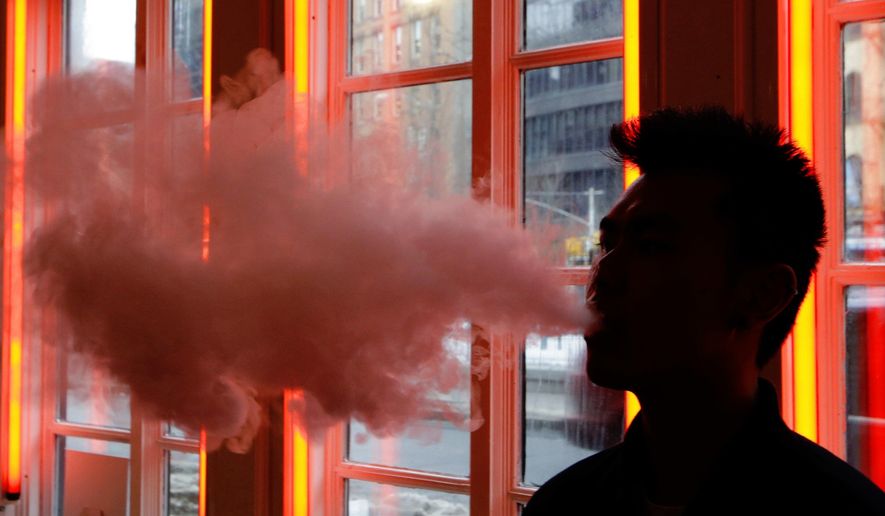The Food and Drug Administration threatened Wednesday to yank flavored e-cigarettes from shelves unless companies find ways to prevent sales to children, saying their use has reached epidemic levels among minors and is an unacceptable trade-off for helping adults wean off regular cigarettes.
Dr. Scott Gottlieb, the FDA commissioner, said his agency issued 1,300 warning letters and fines after an undercover “blitz” this summer pinpointing convenience stores and gas stations that sold vaping devices to juveniles.
The FDA also gave dominant e-cigarette makers 60 days to explain how they plan to reverse the spike in use among minors.
If the companies refuse to revise their marketing practices or prove they are willing to cut off retailers that sell their products to children, then the FDA will knock them out of the market until they make reforms.
“We see clear signs that youth use of electronic cigarettes has reached an epidemic proportion, and we must adjust certain aspects of our comprehensive strategy to stem this clear and present danger,” Dr. Gottlieb said.
E-cigarettes are battery-powered devices that convert liquid nicotine to vapor. Many researchers say the devices are less dangerous than traditional, combustible cigarettes because they don’t contain tobacco’s cancer-causing ingredients.
The FDA said that doesn’t mean e-cigarettes are benign, and officials are worried about vaping’s impact on young people’s brains.
Dr. Gottlieb said his agency’s aggressive posture may create obstacles for adults who use e-cigarettes as substitutes for traditional smokes, but he added that he is willing to pay that price to stop children from getting hooked on tobacco.
“I’ll be clear. The FDA won’t tolerate a whole generation of young people becoming addicted to nicotine as a trade-off for enabling adults to have unfettered access to these same products,” Dr. Gottlieb said.
Leading Democrats applauded the move as a step in the right direction, though some wanted an immediate ban.
“Flavored e-cigarettes should be ordered off shelves immediately — ending ongoing dithering and saving another generation from nicotine addiction,” said Sen. Richard Blumenthal, Connecticut Democrat. “The time is now for real action, not rhetoric or reliance on industry promises.”
The debate is the latest front in the government’s long-running push to keep children from taking up smoking in the first place.
Nearly a decade ago, President Obama signed major legislation that granted the FDA the power to regulate the manufacturing, marketing and sale of tobacco products while banning candy and fruit-flavored cigarettes that were seen as attractive to youths.
There has been noticeable progress, though federal agencies say far too many youths still use tobacco products.
The latest Youth Tobacco Use survey said nearly 1 in 5 high school students and 1 in 18 middle school students reported using a tobacco product last year, compared with nearly 1 in 4 high school students and 1 in 13 middle school students in 2011.
In raw numbers, that is 3.6 million students using tobacco last year compared with 4.5 million in 2011.
E-cigarettes were the most commonly used nicotine/tobacco product among young people last year, with 2 million middle and high school students reporting use.
Erik Nesson, an associate economics professor at Ball State University, said the FDA will have to tread carefully in its crackdown because restricting the use of e-cigarettes could cause adolescents to flock to traditional tobacco cigarettes. If the goal is to restrict e-cigarettes, he said, then one option is to make them more expensive.
“My own work, along with the work of many others, suggests that rising cigarette taxes have been the most effective means of reducing smoking levels in the United States,” he said.
Ana Navas-Acien, a Columbia University professor who also tracks the issue, said some form of government regulation is needed “as companies are unlikely to implement voluntary strategies to effectively cut use among youth.”
The FDA issued warning letters and fines this year to retailers that sold a popular form of e-cigarette, JUUL, to minors. The devices resemble flash drives, bedeviling teachers and parents who are trying to catch children with e-cigarettes.
JUUL said Wednesday that it will work “proactively” with the FDA and wants to be “part of the solution” in thwarting use among children, though it defended the merits of flavored e-cigarettes for other users.
“Our mission is to improve the lives of adult smokers by providing them with a true alternative to combustible cigarettes. Appropriate flavors play an important role in helping adult smokers switch,” the company said. “By working together, we believe we can help adult smokers while preventing access to minors, and we will continue to engage with the FDA to fulfill our mission.”
• Tom Howell Jr. can be reached at thowell@washingtontimes.com.




Please read our comment policy before commenting.